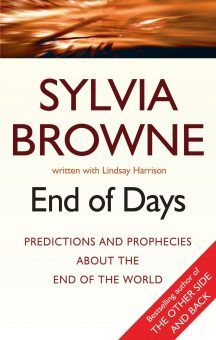CHAPTER FIVE
The Prophets Speak on the End of Days
If there’s any one thing that postbiblical prophets have in common beyond the obvious gift of prophecy, it’s the fact that they have virtually nothing in common. There’s no such thing as a typical prophet, no apparent group God singles out to be recipients of this particular talent, except perhaps a willingness to share their visions with the general public. This chapter, which covers only a tiny cross section of significant “doomsday prophets,” includes three Russians—a flamboyant seer, a “mad monk,” and a physician; two British authors; a genius mathematician and scientist; and a modest Kentucky photographer. They all have established track records when it comes to the accuracy of their prophecies, and I specifically selected them because I happen to find them particularly fascinating. But you’ll notice that even among this small, select group, there’s no consensus on the when, how, or even if of the end of days.
Edgar Cayce
There are few psychics/prophets/clairvoyants who have fascinated me more, and whose body of work I’ve found more compelling, than Edgar Cayce. His life began in 1877. He was a Kentucky farm boy whose formal education ended with grammar school. And by the time of his death in 1945, he’d gained unsolicited worldwide renown as “The Sleeping Prophet,” accomplishing healings, spiritual and metaphysical dictations, and prophecies while in a deep, self-induced, trancelike sleep, none of which he was able to recall when he was awake.
His gifts of prophecy and clairvoyance appeared without warning. Cayce was in his early twenties, making a modest living as a photographer, when an illness caused him to lose his voice. After a year of unsuccessful medical treatments, he took a friend’s advice to be treated by a hypnotist.
At his first session with a local hypnotist, Cayce suggested that, rather than the hypnotist going to the effort of inducing sleep, it would be more efficient if he put himself to sleep, which he’d discovered years earlier he was able to do with ease. Once he was in a deep trance, Cayce astonished his friend and the hypnotist by launching into a precise description and diagnosis of the condition that had taken his voice away. The grammar school graduate, who was as uninterested in reading as he was in formal education, displayed the anatomical expertise of a skilled physician as he spelled out a list of complex physiological instructions for the hypnotist to give him while he was under. The hypnotist did as he was told, following Cayce’s script of suggestions about vocal cords relaxing and arteries opening to restore oxygen and blood to specific paralyzed muscles. And Cayce awoke from that session with his voice fully restored.
Word spread quickly about Edgar Cayce’s gift for diagnosing and curing illnesses while he “slept,” and he immediately began receiving letters and personal visits from clients throughout the country wanting his help with illnesses of their own. His initial reaction was to decline their requests
—he was uneducated, he argued, and inadequate to be given such awesome responsibility. And the fact that when he was awake he had no memory of the expertise he demonstrated when he was in a trance made it even more impossible to believe that his cures were worth relying on. But the one thing he couldn’t argue with was that he’d somehow managed to cure himself, with a hypnotist’s help, when the medical community had failed for more than a year. So finally he came to the conclusion that if he indeed had been given this gift, and if he could use it to be of help to suffering people, it would be reprehensible of him not to at least try.
Pages: 1 2 3 4 5 6 7 8 9 10 11 12 13 14 15 16 17 18 19 20 21 22 23 24 25 26 27 28 29 30 31 32 33 34 35 36 37 38 39 40 41 42 43 44 45 46 47 48 49 50 51 52 53 54 55 56 57 58 59 60 61 62 63 64 65 66 67 68 69 70 71 72 73 74 75 76 77 78 79 80 81 82 83 84 85 86 87 88 89 90 91 92 93 94 95 96 97 98 99 100 101 102 103 104 105 106 107 108 109 110 111 112 113 114 115 116 117 118 119 120




